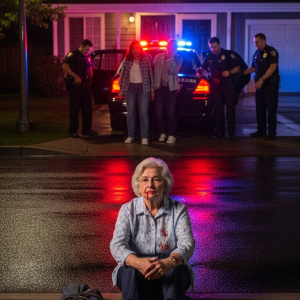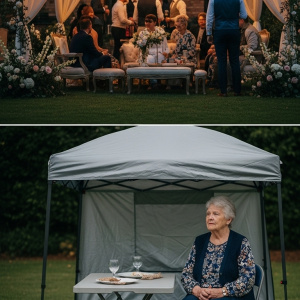When I returned from a quiet visit with an old friend, I expected the porch light to be on, a warm hum waiting behind the door. Instead, I found my life boxed up and dumped like trash. My favorite lamp was lying sideways on the doormat. My suitcase sat against the bushes, half-unzipped. Taped to a photo of me and my son, Brendan, was a folded piece of paper. Six words, no warning, no explanation, just a quiet erasure.
The air was still that evening, the kind of heavy quiet that comes before a thunderstorm. I had only been gone a few days. The house had been calm when I left. Brendan had hugged me at the car. His wife, Kayla, promised she’d water my garden. But as I stepped from the rideshare, I knew something was wrong. The windows were dark. Then I saw it.
My life, curated over decades, was now a small, sad pile on the porch. A pillow I had sewn myself, my night lamp, two framed photographs—one of my late husband, Richard, and one of the three of us at Brendan’s college graduation. Pinned under a magnet was a note in Brendan’s familiar scrawl: Sorry, Mom. No space for you anymore.
I stood there for a long while. I didn’t cry. I didn’t knock on the door of the house I owned. There was nothing left to say. I carefully placed the photos inside my suitcase, tucked the lamp under my arm, and walked away without looking back. The silence that followed me down the driveway was louder than any shouting ever could be.
I spent that first night on a bench in the community garden a few blocks away. I wasn’t ready to call anyone. I needed a different kind of silence, the soft, unassuming kind that lives in the rustle of maple leaves. Years ago, before Kayla, Brendan and I had built a compost bin here. I taught him how to trim herbs without damaging the roots. Now, I sat in that same spot, older, stiffer, and trying to piece together the ruins of the life I thought I had.
As the sun began to rise, I walked to a bus stop. I didn’t have a destination; I just needed to move. By mid-morning, I found myself in a newer part of town, walking past a row of polished townhouses. One of them looked familiar. Brendan and Kayla had talked about moving somewhere like this.
Then I saw them. Through the sheer curtains of a corner unit, I saw my son standing near a dining table. Kayla sat across from him, flipping through a folder, her expression focused. She held up what looked like a real estate brochure, pointing enthusiastically at a picture of a glossy white kitchen.
Brendan looked away. His shoulders had the same slump they used to get when he was a teenager and didn’t want to argue. His eyes drifted toward the window, and for a split second, I thought he saw me. But his gaze was empty. He was looking at nothing at all. That’s when it clicked. All the tiny moments from the past few months fell into place: Kayla insisting on handling the utility bills, the strange mail with Brendan’s name but my address, the hesitations in his voice. This wasn’t a sudden decision. It was a plan.
The next morning, I wandered into the public library, not for books, but for the quiet and the electrical outlets. My phone had died, and I needed to recharge, in every sense of the word. As it buzzed back to life, a familiar voice called my name. It was Martina Wilks, a sharp-tongued colleague from my days in legal insurance review. We hadn’t seen each other in years, but some friendships exist outside of time.
She offered me coffee, and as we sat by a window, she told me she’d run into Kayla a week ago at a local property mixer. “She was all smiles,” Martina said, her eyes narrowing slightly. “Talking about plans for the house, possibly listing it soon. I just assumed you had already downsized and moved out.”
I didn’t answer. I didn’t have to. Martina read my face like the fine print on a contract. “Something doesn’t feel right,” she said. I nodded slowly. She asked if I had access to the house title. I told her, “I used to.”
Her expression hardened. She told me about a case she once handled, where a daughter-in-law with power of attorney had quietly moved her mother-in-law into assisted living and flipped the house in six weeks. The story was a cold shock of recognition. Kayla offering to manage the water bill, Brendan “forgetting” to hand me the insurance notice, my missing checkbook last spring. They weren’t accidents; they were calculated steps.
Martina handed me her card. “Too many mothers are edged out of their own homes by paperwork and polite lies,” she said. That evening, I rented a small P.O. box. It was just a metal drawer in a federal building, but it was mine. A place to redirect my mail, a place to start rebuilding my name on paper. The storm wasn’t over, but now, finally, I was turning to face it.
The key still worked. I hadn’t stepped inside my old consulting studio in over five years, but my hand knew the turn of the lock. The small, second-floor space above a bookstore was my quiet retreat, a place no one but Martina and I knew about. The air smelled of dust, lemon oil, and the faint trace of printer ink. This was where I used to help widows sort through policy paperwork after their husbands passed. Now, I was here to sort through my own life.
In a back cabinet, beneath a stack of old files, I found what I was looking for. The original deed to my house. The notarized copy of the title. The co-ownership agreement Richard and I had drawn up decades ago. Everything was solely in my name. Brendan’s wasn’t mentioned anywhere. We had wanted him to make his own life, not take ours.
Then I examined the recent utility bills I had brought from the house. They were all now addressed to Kayla. My name had been wiped clean. At the top of one envelope was a utility request form with a forged signature. It was a crude imitation of my handwriting, a clear and deliberate act of replacement.
I didn’t cry. I opened the small fireproof safe under the desk and placed the deed and the other legal documents inside. They thought I was out on the street, helpless and erased. They had no idea what I still held—not just in memory and resolve, but in cold, hard proof.
The next morning, I met Martina at her office. I laid the documents out on her desk: the deed, the joint ownership agreement, the forged utility requests. She skimmed every page, her expression grim. “This is no mistake,” she said, her voice low. “They’re laying the groundwork to remove you legally. They’re counting on you not fighting back.”
Her words didn’t sting; they affirmed. She made a call, and within minutes, we had a name: Ashby Sterling, a retired estate attorney who specialized in asset protection for older women. Two days later, I was sitting in Ashby’s small, tidy home office. She was older than me, with short silver hair and a presence that commanded the room without raising her voice.
I handed her the file. She read slowly, her eyes missing nothing. When she was done, she folded her hands. “None of this changes the fact that you are the sole legal owner,” she said evenly. “The utility changes, the mail redirect… it’s circumstantial. It is not a lawful transfer. But if they use it to leverage a sale or a refinance, that becomes fraud.”
Ashby walked me through the next steps. A formal cease and desist letter. A notification to the county clerk’s office to flag any attempted transactions on the property. A protective memorandum filed with the neighborhood council to alert local realtors. It wasn’t a dramatic declaration of war. It was a quiet, methodical construction of a legal wall. That day, I signed the papers with a hand that did not shake.
By the end of the week, every letter had been sent. Then, on a quiet Wednesday afternoon, my phone began to ring. Brendan. I let it go to voicemail six times before a short, sharp text came in from Kayla: You didn’t have to go this far. I waited until that night to reply with a single line: Everything has a reason. So does this.
The next evening, Brendan showed up at my studio. He knocked, then waited. When I opened the door, he looked tired, more confused than angry. He stood by the window, staring at the papers on my desk. “I didn’t know about everything,” he started, his voice low. “Kayla took the lead… she thought you needed rest. It wasn’t supposed to escalate like this.”
I let him speak, his excuses filling the quiet room. Finally, I asked the only question that mattered, not as a mother, but as a woman speaking to a man who should have known better. “Why didn’t you stop her?”
He looked at the floor, unable to meet my eyes. “Because I didn’t want the conflict,” he admitted slowly. “Because it felt easier to step back. Because I didn’t think you’d push back.”
It wasn’t cruelty that had driven him. It was cowardice. He hadn’t chosen her over me; he had chosen his own comfort over his mother’s dignity. And that, I realized, was its own profound betrayal. When he left, I closed the door gently. I had already lost the illusion of family; what I had found in its place was the steady, unshakeable ground of my own resolve.
A few days later, a courier arrived with a letter from a real estate firm—a pre-sale evaluation request for my house, addressed to Brendan and Kayla. They were testing the wall we had built, hoping to find a crack. Martina and Ashby responded immediately, reinforcing the legal restrictions and notifying the realtor directly. Any further inquiry would require my notarized, in-person authorization.
That Sunday, Brendan came again. This time, his eyes held a tighter, more strategic glint. He stood on the porch, not asking to come in, and spoke of “misunderstandings” and “communication gaps.” He said Kayla was scared I would retaliate and make everything public. He was trying to manage the fallout.
I looked him in the eye. “You knew,” I said, the words quiet but firm. “You always knew. And you let it happen because it benefited you.” He didn’t argue. He just repeated that he was tired, that standing between me and Kayla was impossible. In that moment, I saw him clearly. He wasn’t a pawn; he was a willing participant who had chosen comfort over courage. I thanked him for coming and closed the door, not with anger, but with the quiet finality of someone who could no longer pretend.
The next escalation was criminal. Martina’s private records monitor flagged an attempt by Brendan to secure a line of credit against the house using a joint ownership profile he had fabricated online. He had submitted a scan of my old driver’s license and a utility bill with a forged signature. Ashby moved swiftly, notifying the bank’s fraud unit and filing a notice with the district attorney. A silent lockdown was placed on my name and address. Brendan wouldn’t know it until he tried to move again, and hit a wall of his own making.
The invitation came via text: We’re having a family discussion Saturday. Hope you can come. It’s time to clear the air. I forwarded it to Ashby. Her reply was immediate: Let me come with you.
The house was staged for a performance. Cushions were fluffed, candles were burning, and a cheese board sat untouched. Kayla stood by the fireplace, her smile stretched too wide. Brendan greeted us with a nervous handshake.
“We know there’s been some tension,” Kayla began, her voice smooth as silk. “This is still your home, too.”
Ashby reached into her briefcase and set down the cease and desist letter. “Actually,” she said, her voice calm and clear, “this home belongs solely to my client. She remains the legal owner on all official documentation. This is not a discussion. It is a confirmation.”
Silence fell. Brendan went pale.
Ashby continued, her tone even. “We are also aware of forged documents submitted to multiple institutions. Those filings have been reported. Further action is pending, but for now, my client reserves the right to press charges for fraud.”
I stood up. I didn’t need to yell. “You tried to write me out of my own life,” I said, looking directly at my son. “You thought I wouldn’t notice.” Then I turned and walked out. At the door, Ashby paused. “If you attempt to interfere again,” she said, “legal proceedings will follow immediately.”
The next morning, I walked into the old house one last time. They were in the kitchen, silent. I stood at the threshold and said, “I’m selling the house.”
Kayla froze. Brendan looked up, his lips parted.
“Not for revenge,” I continued. “Just because it’s mine, and I no longer want my name on walls that have forgotten me.” I placed the listing agreement on the table. “The proceeds will not be going into your pockets. I’ve transferred the full amount into a foundation—a fund for women over sixty who have been silenced or discarded by their own families. It will help them find legal support, housing, and dignity.”
I didn’t wait for a reply. I stepped outside and closed the door gently behind me. I didn’t look back. I opened my phone and pulled up the address of my new apartment. Small, quiet, and mine. Then I tapped send on the press release Ashby had drafted. The foundation would go public that week. They had pushed me out to make space for themselves. Now, I would make space for someone else who truly needed it.
My new apartment was small, filled with morning light. I kept things simple: a reading chair, one photo of myself at the ocean, and a lavender plant in a clay pot. I named it Mercy. The silence here was different. It wasn’t empty; it was peaceful.
The foundation grew, slowly but steadily. Donations arrived, along with letters from women with stories too familiar. One wrote, “Thank you for existing. I read it twice.” The old house sold. Brendan and Kayla moved out. There were no more calls, no more texts. The silence didn’t feel like abandonment anymore. It felt like space.
One afternoon, I found the photo from Brendan’s graduation. I hadn’t noticed it before, but the edge of the image had been trimmed. My face had been cleanly, surgically removed. I stared at it for a long while, not with sadness, but with a quiet recognition. I placed the cropped photo in a wooden box with other relics of a life that was no longer mine. I didn’t erase them from my memory; I simply chose not to center my life around people who had edited me out of theirs.
That spring, I planted new lavender on my windowsill. It bloomed unevenly, crooked toward the sun, but it grew. And that was enough. Healing doesn’t always arrive like thunder. Sometimes it moves like breath, quiet and slow. But when it arrives, it changes everything.




